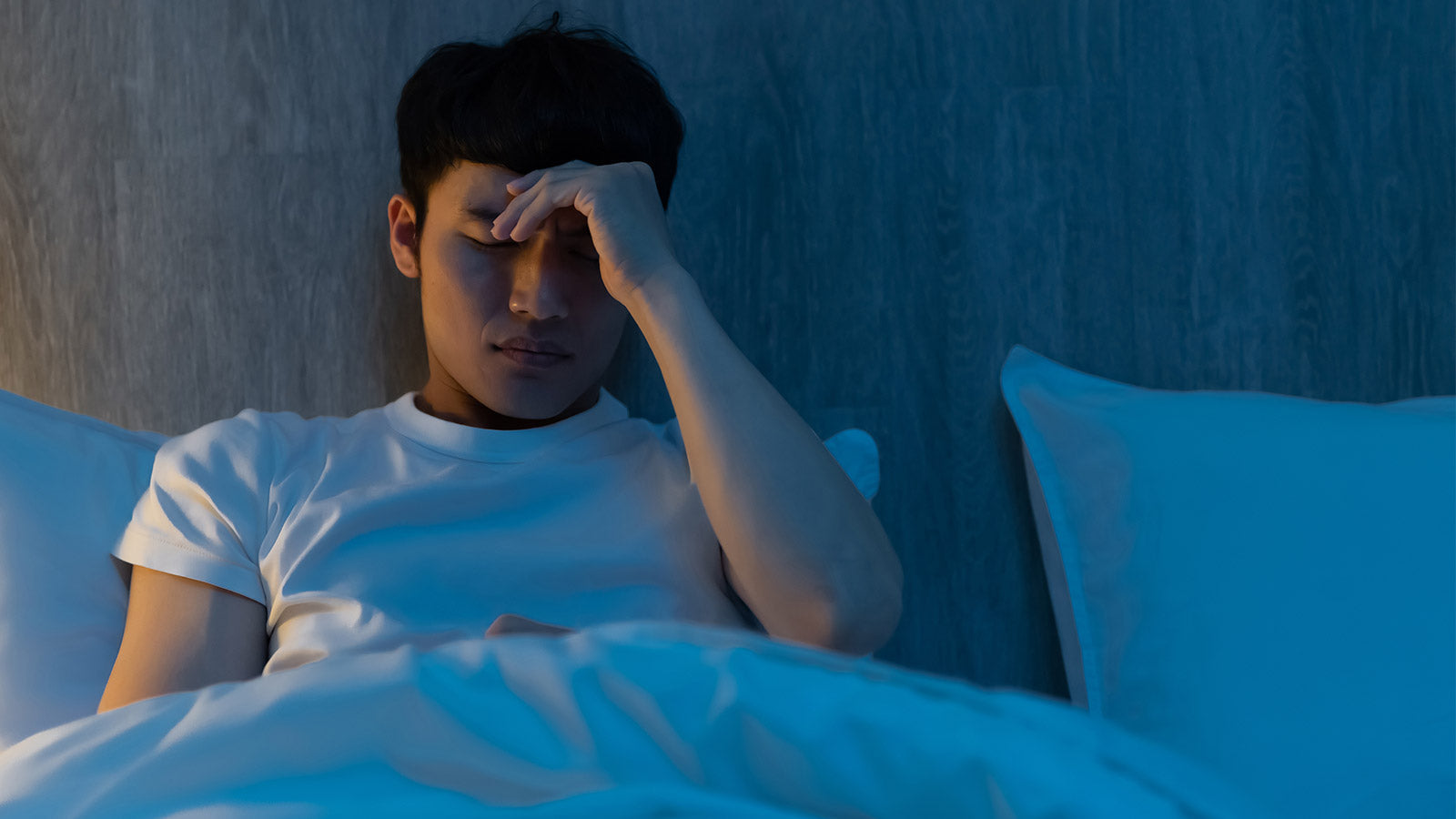By Dr. Damiana Corca, sleep & wellness specialist, Doctor of Acupuncture, Chinese Medicine, and Functional Medicine
Our daily stress has skyrocketed in the past couple of years and sleep disorders are on the rise. According to the American Sleep Association [i], 37% of 20–39-year-olds report not sleeping enough while 40% of 40–59-year-olds report short sleep duration.
If you are one of the people who wonders “why can’t I sleep?” because you have trouble falling asleep, staying asleep or you find yourself laying awake too early in the morning, you are not alone.
Being unable to sleep well at night can feel like a very lonely and isolated experience. When this is compounded by the fatigue and daytime sleepiness that can follow the next day, our mental health suffers. The anxiety that tends to build up can further exacerbate the sleep issue.
Here are three main reasons you can’t sleep well and what to do about it:
1. Your evening routine (or lack of it) is hurting your sleep quantity and quality
Your evening routine can make or break how you experience your sleep each night. The most important thing to remember about your sleep routine is to do things that are conducive to sleep and make sure they feel good. This is because we don’t want to add yet another set of chores to your schedule.
Fill the hour before bedtime with quiet activities, away from any electronics. If you want to scroll on social media or watch a movie because you find it relaxing, then do so prior to the hour immediately before bedtime. This can prevent too much stimulation, and the blue light coming from digital screens can stunt your body’s melatonin creation. As a reminder, melatonin is a natural hormone released by the brain into the bloodstream to regulate the body’s sleep cycles.
Decide what time you want to go to bed and keep it consistent each night. If 10pm is your desired bedtime, at 9pm start preparing for bed. Turn down your bed, brush your teeth, take a bath or shower, and complete the other activities that fit your personal bedtime routine.
Then sit or lay down and do a mindfulness practice. Simply feel your breath and observe your thoughts for 10 minutes. Keep coming back to feeling your breath and the sensations of your body every time you notice your mind drifting away. If you struggle to keep focus, try thinking “now I’m breathing out, now I’m breathing in” to keep your mind from wandering. This is the practice of meditation and can greatly calm down your nervous system so you can get good sleep. Conversely, you can use a guided mediation from various apps such as Insight Timer or Calm.
This practice can be followed by journaling or writing down things that need to be done. You want to empty your mind and let go of thoughts so you can settle into a deep, restful sleep at night.
You may also read a book that is relaxing and not too engaging before bedtime. Only go to sleep when you feel tired. That is more important than the exact time you fall asleep.
2. Your body and mind are too stimulated by your daily habits to be able to sleep at night
We may be sleeping only one third of 24 hours but every of one those hours can potentially influence how good we sleep at night. You can’t be rushed, stressed and caffeinated for most of the day and expect to sleep deeply and peacefully at night. Our sleep is a reflection of how well our nervous system can settle into letting go and surrendering to full, deep rest.
One of the first steps you can take to bring awareness to how you spend your day is splitting it into 12-hour chunks. For example, 7am to 7pm can be mostly filled with the part of your life that is more active such as exercise, doing your job, or being fully present in the world. Then, 7pm to 7am is about slowing down, resting and sleeping. What happens more often than not is we jump from the active part of the day into demanding our body go to sleep. Allowing 2 - 3 hours before sleep to slow down, connect with your body, and let go of your busy day will greatly encourage deep, restful sleep. Following this 24-hour cycle breakdown supports your natural circadian rhythm which enhances good sleep and great energy throughout the day.
Consuming caffeinated drinks before 10am can also be helpful to make sure all the caffeine is out of the body by the time you start preparing for bedtime. Contrary to popular belief, most people who struggle with sleep problems may still have some caffeine left in their bodies if drinking after 10am.
Drinking alcohol can also interfere with sleep issues. The general recommendation that helps many people with sleep issues is to drink no more than one drink three hours before bedtime and no more than three days per week. This way the liver doesn’t have to process the alcohol while you are sleeping, and there is plenty of time to do so before bedtime.
You can further support your winding down process with supplements containing calming ingredients such as ashwagandha, lemon balm, or chamomile.
3. Your body’s functions such as hormonal or digestive systems are not working well and are keeping you up
Some people do all the “right” things to improve their sleep quality, yet they still can’t sleep. If you have worked on the things mentioned so far and still find yourself sleep deprived, tired and sleepless, the root cause of your sleep issues may be deeper.
For example, hormonal changes (especially for women ages 30 – 55) can be at the root of why you can’t sleep. Perimenopause, the period of time before entering menopause, can last up to 12 years and be one of the root causes of why women experience ongoing sleep issues, anxiety, depression and weight issues.
Another common root cause for why you can’t sleep is less than ideal digestive health. Irregular bowel movements, bloating, gas, or acid reflux are some of the signs that your digestive health is not in top shape. This can affect not only your sleep but also your mood. This is mainly because one of the most important neurohormones for good sleep and healthy mood is serotonin, which is predominantly produced in the gut. Oftentimes a healthy gut will result in healthy sleep & healthy moods due to serotonin production.
Lastly, one of the most missed root causes for sleep issues is sleep apnea. Sleep apnea is a sleep disorder in which breathing repeatedly stops and starts throughout the night. According to the American Academy of Sleep Medicine[ii] two of the key risk factors are high blood pressure and excessive weight. However, many people don’t meet these risk factors and still have sleep apnea, which is why it is best to check in with your medical doctor.
In order to look deeper into why exactly you can’t sleep, in addition to working with your medical doctor, try working with a holistic practitioner such as a functional medicine practitioner, naturopath or acupuncturist. They can help you identify the root cause of your sleep issues.

Dr. Damiana Corca
- Doctorate in Acupuncture and Chinese Medicine, Pacific College of Health & Science
- Certified Functional Medicine Practitioner, Institute for Functional Medicine
- Masters of Oriental Medicine, East West College of Natural Medicine
- Bachelors in Health Sciences, East West College of Natural Medicine
If you want to learn more about root causes for sleep issues and how to solve them, get this free gift from Dr. Damiana Corca.
Consultant does not formally endorse Elixinol products.
------------------
[i] https://www.sleepassociation.org/about-sleep/sleep-statistics/
[ii] https://aasm.org/clinical-resources/patient-info/defend-your-sleep/




